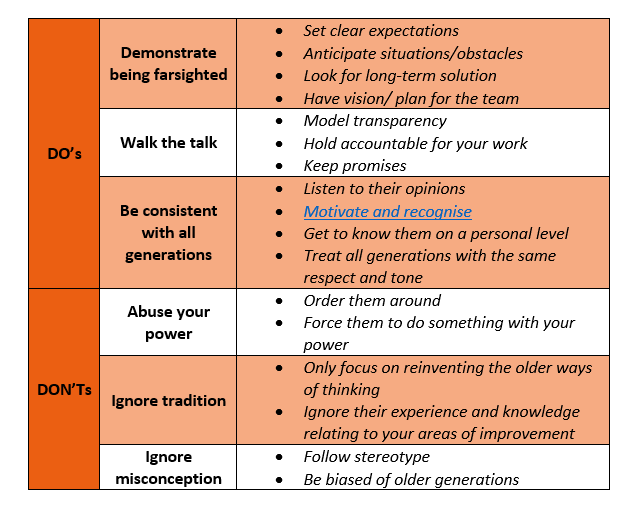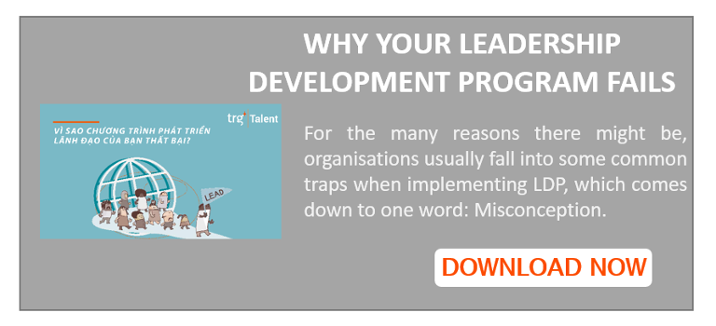In the last post, we pinpointed two factors that turn Millennials in to troublesome team players. We know that teamwork and collaboration activities are becoming an integral part in any organisation. And the talented, dynamic young people are playing more important role in the organisations than ever as well. But it will be a problem if these two essential elements are not on par with each other, especially due to such an external factor that three generations are working under the same roof. This time, we recommend six concrete advices for you to eradicate the differences between generations in your team.
Case 1: You’re a Millennial and managing a team across generations
Millennials are steadily taking over leadership positions. But your team are not always full of the young. Chances are some of your subordinates are older and more experienced but you can’t ignore them and focus on the younger ones from your generation. In this case, you are advised to:
- Not dwell on differences
You know you’re different from them. They know they are different from you. But that’s just it. Don’t assume that they need special treatment from you or you should highlight anything like “People my age feel this way”. And don’t stereotype them as out-of date because they can be as innovative and tech-savvy as you are.
- Build trust
Why do previous generation not follow a Millennial leader? The most common reason is they don’t trust him/her. The rationale may lie in the check boxes on the left of Figure 2. But how to gain their trust is a more important matter. Here are some Do’s and Don’ts for you to make them have faith in you.

- Encourage cross-generational mentoring
The experienced subordinates are valuable sources of experience and knowledge to your team. Create a mentoring programme across generations for the experienced members to share and help the younger teammates develop. This makes them feel valued and respected while you can achieve two goals of developing potentials and retaining talents.
Case 2: You’re from previous generation and managing a team of Millennials
Even the leader from earlier period of young generation (born between 1980s and early 1990s) have difficulties in managing members from later period (born after 1994 or 1995). The rising popularity of Internet and smartphones during growing up did separate these two periods, causing differences in even young generation. It’s hard to manage a bunch of people full of energy and different, sometimes crazy ideas but the following points might help you keep them under control.
- Create a vibrant atmosphere
Young people love a flexible and lively working environment and an empathetic leader. They also love to connect with everyone in team on a personal aspect. Therefore, you should leverage on team bondings or collaboration activities to liven up the mood in the team. Regardless of your team’s function, fun and flexibility are necessary spices to connect with young people.
- “But first, let me set some expectations!”
The ultimate goal of working together is to achieve results; therefore, setting up limits and expectations at the beginning will help mitigate the risk of team member crossing the borders of professionalism in exchange for fun. As a leader, make clear how you want your team to be and objectively explain the behaviours that should be adopted/stopped due to their impact on the organisation. If possible, ask them to think of some behaviours they find unacceptable or having negative impacts on the team efficiency, then make it a rule. Review them frequently and every time you add new team members. And be a role model abiding every rule.
- Motivate and develop strategically
Meaningful work and work-life balance are what the young seek for in a job. But to achieve these, they surely have to go through challenges and sometimes tough moments. Therefore, as a good and respectful leader to them, you should be able to motivate team members in time of hardship. And they also appreciate knowledge or practical experience sharing from you to give them clues to overcome obstacles, enrich their understanding and help pave their career paths.
Generation gap is common in the current business scene, but instead of endure or even avoid multi-generational teams in the organisation, you should leverage the differences in values and expectations of each generation. And remember that each person has his/her own characteristics and motivators. You’d better spend time figuring out the special traits in your team members and treat them based on their personality instead of their generation.
 English
English  Vietnamese
Vietnamese 


